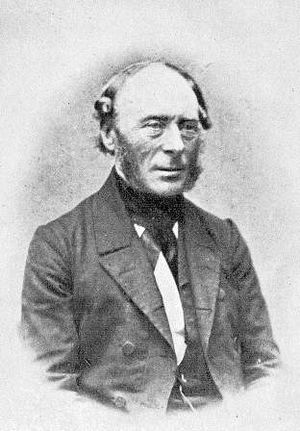Magnús Eiríksson facts for kids
Magnús Eiríksson (born June 22, 1806, in Skinnalón, Iceland – died July 3, 1881, in Copenhagen, Denmark) was an Icelandic thinker and writer. He studied theology, which is the study of religious faith and practice. Eiríksson became known for his strong opinions and criticisms of important religious figures of his time, like Søren Kierkegaard and Hans Lassen Martensen.
He often disagreed with traditional church teachings, especially about the idea of God as a "Trinity" (God as Father, Son, and Holy Spirit) and the belief that Jesus was fully divine. Instead, Eiríksson believed in the unity of God and saw Jesus mainly as a wise prophet and teacher. Because of these ideas, he was sometimes called a "pioneer" for the Unitarian movement in Denmark. This movement emphasizes the unity of God and the humanity of Jesus.
Contents
Early Life and Education
Magnús Eiríksson was the oldest of five children. His father, Eiríkur Grímsson, was a farmer, and his mother, Þorbjörg Stephánsdóttir, was a pastor's daughter. He was born in Skinnalón, a place in northeastern Iceland.
In 1831, Magnús moved to Copenhagen, Denmark. He stayed there for the rest of his life. He studied theology at the University of Copenhagen. There, a professor named Henrik Nicolai Clausen greatly influenced him. Clausen taught a form of "rationalism" in theology, which means he believed that faith should be based on reason and logic.
After finishing his degree in 1837, Eiríksson became a tutor for theology students. He was quite popular among them.
His Views on Martensen and Kierkegaard
Magnús Eiríksson had very strong opinions about other thinkers of his time. He often disagreed with their ideas.
Challenging Martensen's Ideas
Eiríksson strongly criticized H. L. Martensen, another theologian. He believed that faith should always be based on reason. He famously said that "only that which can be accepted by reason can and should be accepted by faith."
Martensen chose not to respond to Eiríksson's criticisms. This silence made Eiríksson very angry. In 1847, he even wrote a letter to the king, King Christian VII. He called Martensen's silence "inexcusable" and demanded that Martensen lose his professorship.
Eiríksson's strong accusations against Martensen also included criticisms of the government. This led to legal action against him. However, when the king died in 1848, a new king, Frederik VII, took the throne and offered a general pardon. This meant the charges against Eiríksson were dropped.
Unfortunately, Eiríksson's attacks on Martensen hurt him financially. Students, who supported their famous professor, stopped hiring Eiríksson as a tutor. He even asked Søren Kierkegaard for financial help twice, but Kierkegaard refused.
His Relationship with Kierkegaard
Eiríksson thought that Søren Kierkegaard, another famous philosopher, would agree with his criticisms of Martensen. Kierkegaard's book, Concluding Unscientific Postscript (1846), seemed to support Eiríksson's view.
However, Kierkegaard strongly disagreed with Eiríksson's claim that they were allies. Kierkegaard called Eiríksson a "raging Roland" and said Eiríksson had completely misunderstood his writings. Kierkegaard wrote that Eiríksson had "absolutely, mendaciously and presumptuously misunderstood" his book.
In 1850, Eiríksson published a book called Is Faith a Paradox and ‘by Virtue of the Absurd’? In this book, he criticized Kierkegaard's idea of faith. Eiríksson argued that faith should not be seen as a "paradox" (something that seems contradictory). He believed that true faith comes from human reason. He felt that seeing faith as a paradox would "destroy all independent thought."
Kierkegaard wrote an answer to Eiríksson, though he never published it. He said that Eiríksson had completely missed the main point of his work. Kierkegaard believed that in his effort to prove faith wasn't a paradox, Eiríksson had lost the true meaning of Christianity.
Later Years and Changing Views
After 1850, Eiríksson was mostly quiet for several years, except for a few articles. During this time, he went through a personal spiritual journey. He began to believe that the church's teaching that God became human through Jesus Christ was wrong. He thought this idea could lead to people thinking they were gods themselves.
Influenced by new ways of studying the Bible, Eiríksson changed his views even more. In his 1871 book, Jews and Christians, he concluded that Judaism, which he saw as a simple, childlike trust in God, was the only true religion. He believed Jesus had only wanted to make Judaism purer, and that people should return to this purified form of faith.
Eiríksson's later writings caused many discussions. In Denmark, some people strongly disagreed with him, while others openly supported his ideas. In his home country of Iceland, however, his views were mostly met with strong disapproval. His 1863 book, The Gospel of John, caused a fierce debate there.
In Sweden, Eiríksson's ideas were more accepted, thanks to a pastor named Nils Johan Ekdahl, who translated two of Eiríksson's books into Swedish. Eiríksson's last writings were published in Swedish newspapers and journals.
In his final years, Eiríksson faced financial difficulties. His friends helped him by arranging a small income to add to his state pension. In 1878, they even raised money for him to visit Iceland, but his health was too poor. Magnús Eiríksson passed away on July 3, 1881, in Copenhagen. His friends placed a bust (a sculpture of his head and shoulders) on his grave.
Images for kids
 | Chris Smalls |
 | Fred Hampton |
 | Ralph Abernathy |




